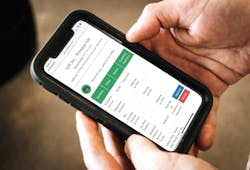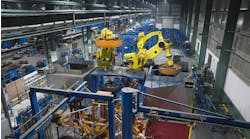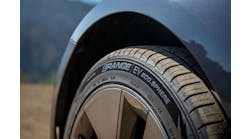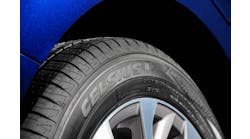COVID-19 changed how independent tire dealerships do business — in many positive, profit-enhancing ways. One year later, 10 thriving tire dealers describe the quick, sometimes-tough decisions they made after the pandemic hit, how those changes made their businesses stronger and why other dealers should follow suit.
Here are their stories, recommendations and ideas:
Scrutinize Your Inventory
When tire demand dropped during the first few months of the pandemic, inventory levels at Birdsboro, Pa.-based CJ’s Tire and Automotive followed suit. “That probably ran through the summer,” says Bill Bainbridge, the dealership’s vice president of marketing and development.
“Then when we saw business coming back a little bit, we started hearing about tariffs, shortages and surcharges. We didn’t want to get into a position where we didn’t have enough product, so we made smart decisions on inventory.”
CJ’s Tire eliminated slow-moving sizes in favor of focusing on an “80%-of-the-business-is-20% of-the-SKUs” philosophy, he explains. “We loaded up on that 20%. We also made sure we had strong secondary supply relationships.
“In the past, we tried to carry a lot of inventory. We wanted to have the product in stock. But what we found is that the pandemic changed things from the consumer standpoint.”
First, customers didn’t miss the “auxiliary SKUs” that CJ’s Tire eliminated, he reports. Service expectations also shifted, says Bainbridge. “Customers said, ‘Hey, if I have to wait two or three days for tires, that’s OK with me.’ Before, we never thought customers were OK with that.”
And more customers demanded “bottom line” pricing. “‘How much money do I need to bring with me? How big of a check am I going to write? How much will I have to put on my credit card?’ We became a lot more sensitive to questions like those. Training our associates to get to the final price a lot faster” became a priority.
Bainbridge says CJ’s Tire will continue to keep an eye on the size and make-up of
its inventory.
“The pandemic forced us to look at things a little harder. It changed the way we do business with direct suppliers. It changed the way we do business with our secondary suppliers.
“Inventory turns, managing inventory and not having a lot of dead stock are all behind-the-lines ways you can save money and even make money. And I don’t think that’s going to change.”
Get Digital
Customers’ pandemic-driven desire to observe social distancing during the tire buying process accelerated the roll-out of several new digital tools at VIP Tires & Service.
“We have a lot more online appointments now, which are linked to our online system,” says Tim Winkeler, the Lewiston, Maine-based dealership’s president and CEO. “Appointments that people make on our website are directly linked to our point-of-sale system and calendar.
“We also have seen a really significant increase in the amount of customers going to our website and using its ‘chat with an expert’ feature,” which Winkeler says is manned by former store service managers.
“We’ve promoted service managers to these quick-chat positions. But instead of standing behind counters, they’re now on laptops. They can log into any of the 63 stores in our chain, build an estimate in that store’s system and put an appointment on the customer’s calendar. When the customer shows up, everything is ready.”
VIP also is communicating with more customers via text.
“Customers can shoot us a text when they arrive at our stores. Once we perform an inspection of their vehicle, our software lets us text recommendations to them. They can either accept or decline the work we recommend.
“We then text the customer when the vehicle is ready and they can text to pay. They insert their credit card information and pay as if they were paying any kind of e-commerce transaction. Then they pick up the vehicle.
“You can have a full transaction with the customer without that customer ever coming into the store.”
It’s also a way for VIP to capture younger customers, says Winkeler. “I have four young kids in their ‘20’s and they’d rather do things on their phones.”
Not all of the dealership’s customers have “gone digital,” he adds — and that’s OK, too.
“If a customer prefers not to be contacted by text, we‘ll do it the traditional way and give them a call,” adds Winkeler. “We let the customer choose. We don’t try to force any process onto the customer.”
Keep the Best
The pandemic was an opportunity to pause and look around at what is real and what needs improvement, says Julie Holmes, co-CEO of Fairfax, Va.-based Virginia Tire & Auto LLC.
Holmes explains that her company turned its sights inward toward employees — and that included the subject of employee retention.
A compensation plan that was put in place during the pandemic will continue into the future, she says. “Things take years to really refine and we have been updating our store structure and improving our compensation plans to really reward our top performers.
“We have a vision of the future and one of the prongs is to become an employer of choice. We really believe that an employer of choice is the type of company that someone wants to work for.
“You absolutely have to be focused on your people and part of that is having clarity,” says Holmes. “That means having the right store structure and, of course, having the right compensation structure.”
Like other dealerships, Virginia Tire also got more flexible with its workforce. Its accounting, human resource and marketing personnel will continue to work remotely even after the pandemic ends, says Holmes.
“We haven’t seen a negative impact. Our teams really enjoy the flexibility. We always shied away from it” in the past. “But the flexible aspects have been good.”
Virginia Tire’s business continues to grow, too. The company will add its 18th store this summer and is actively hiring to add to its 275-person workforce.
Put it in Writing
Durand, Wis.-based Bauer Built Inc. has always believed in the importance of having formal, written policies in place to deal with run-of-the-mill situations — and also the unexpected. When COVID-19 reached its area, the dealership was ready, according to President Tad Bauer.
“We put something into play even before the government did,” he says. “We didn’t want to wait for someone else to take care of our employees.”
Bauer Built’s COVID-19 policy included protocols for dealing with employees who tested positive for the virus. It also made provisions for “cases in which employees had to work from home, even if they were healthy, because their spouse was sick or they had to find a child care provider.
“It was a bit scary early on because there were so many unknowns. There wasn’t a ton of guidance. But throughout this whole process, we made sure our people were taken care of. And based on how we came through the storm in 2020, they took care of us.”
All businesses can benefit from the creation of — and adherence to — formal, written policies, according to Bauer. And don’t be afraid to revise them as needs change, he adds.
“Our department heads, who are basically my direct reports, review our policies once a year” on a rolling basis.
At various times, decisions have been made to overhaul and even eliminate policies “because they no longer conform to what we’re trying to accomplish. If you aren’t (putting policies in place), you definitely should.
“They set a good foundation for who we want to be and how we want to operate. They’re good guidance.”
Keep Your Team Together
When COVID-19 hit, there were a lot of adjustments for dealers to make. Mark Rhodes, co-owner of Cape Girardeau, Mo.-based Plaza Tire Service Inc., worked hard to keep both his workers and customers in comfortable situations. (Rhodes and his brother, Plaza Tire co-owner Scott Rhodes, won MTD’s Tire Dealer of the Year Award in 2017.)
Plaza Tire was forced to make some staffing adjustments after COVID-19 struck, but overall kept its team intact.
“We never let anybody go and therefore, we didn’t have to fight that battle with rehiring,” says Mark. “I know a lot of guys who fell into that trap.
“In the beginning, we reduced some hours, but we never laid anybody off or furloughed anybody. And I think that worked out pretty well. I know a lot of companies that did lay people off and furloughed people and when they tried to get them back, they couldn’t because (those ex-employees) had picked up other jobs.”
Plaza Tire, which has continued to add locations during the pandemic, “tried to bob and weave our way through the hard parts, which is the mask wearing and the cleaning,” says Rhodes.
“The customer changed, so we had to make them feel better. It’s about getting the sale, right? If we don’t make them feel good, they don’t come back to us. So you make them feel good.”
Divide, Monitor and Conquer
“There’s no manual on how to run a business during a pandemic,” says Brooks Swentzel, president of Lexington, Ky.-based S&S Tire/Best-One. And one person can’t do it all.
That’s why the dealership’s management team divided into sub-groups right after the pandemic hit and began meeting on a daily basis. “Whatever we had been measuring on a weekly, bi-weekly or quarterly basis — whether it was cash coming in, cash going out, collaboration with our suppliers — we made it a daily process.
“We made sure we were monitoring all of our key performance indicators daily,” he says. “We made sure all of our salespeople were engaged and we gave them a playbook to make sure they were talking to their customers on a daily basis.”
S&S Tire’s management team also streamlined communication from the customer level “back up to our management and operation folks to make sure we understood the needs of our customers.
“And we put transfer processes in place so we could move products from our distribution centers to the places that needed them. If you are a customer who is serviced out of our Lexington location, not only could you see the inventory there, but you also could see the inventory at our Huntington, W. Va., Louisville, Ky., and Cincinnati, Ohio, locations.”
Swentzel admits that what worked for S&S Tire may not work for all dealers.
“Everybody is set up differently, obviously,” he says. “But what worked for us was being able to identify the biggest challenges and roadblocks. And we did what I think is a decent job of bringing the whole management team together — and making sure these challenges were on somebody’s radar every day.”
Stay Focused on Health and Safety
When the pandemic hit, Dayton, Ohio-based Gem City Tire focused on taking care of its own staff, who in turn have taken care of the commercial tire dealership’s customers.
President Jeff Lecklider says this is a focus that he will maintain with his employees, who work across seven stores in three states.
“We took everyone’s temperature with a digital thermometer at all of our locations and recorded it,” notes Lecklider. “And we are still doing that today. We are really promoting (the idea) that if you don’t feel well, don’t come to work.
“Throughout the years, we all have probably gone to work when we shouldn’t have. But for a lot of different reasons, that is probably not a good habit to stay in.”
Lecklider adds that Gem City Tire continues to have its truck tire technicians sanitize their road service trucks multiple times per week.
Technology also will continue to play a part in Gem City Tire’s future — and in keeping its employees safe.
“We are doing a lot less travel between our stores. We are taking advantage of Microsoft Teams — having more of our meetings via the computer, rather than in person.
“This has been technology that we have been able to take advantage of and quite frankly, will probably continue to do that. We are connecting with our people more often than we ever have.”
Get Together With Other Dealers
There’s strength in numbers, according to Brandon Johnson, general manager of Eagle Tire Pros, a single-location dealership in Jacksboro, Tenn.
Johnson says membership in a program group — in his company’s case, American Tire Distributors Inc.’s Tire Pros organization — “helped us stay competitive and will help us to stay competitive moving forward.
“Having those relationships, being able to pick up the phone and having the confidence that I will not only get a product quickly, but that it will be a quality product — that’s super important,” he says.
Johnson participates in Tire Pros’ marketing council, which gives him the opportunity to hear other dealers’ perspectives. And he says that belonging to a program group that offers its members consistent signage and programs has helped his dealership pick up new business during the pandemic.
“We’re in a large vacation spot. We have lakes and mountains. I have a lot of customers coming in from other areas, where they’ve been working with other Tire Pros dealers.”
Seeing the Tire Pros name gives customers confidence that they will receive a consistent level of service at his store, says Johnson.
Buy Better and Smarter
Beth Barron, CEO of Morgan City, La.-based Chabill’s Tire Service LLC, says the pandemic has changed her thought processes. “It definitely has made this business a challenge with inventory and buying things — buying competitively and having product on the shelf and having it priced right. It has been such a moving target.
“I was going to try to figure out ways to manage my inventory better” before COVID-19 even hit, she says. “I made the decision to not stock as many tires. It really has been one hard thing after another. I felt like I was managing on a day-by-day basis. It was like, ‘What I did yesterday — oh, that didn’t work. Let’s try something else.’”
At her company’s stores, Barron thinks cleanliness has taken on even more importance due to the pandemic and that will last moving into the future.
“Maybe it has made people a little more respectful of personal space and keeping workspaces clean,” she says. “And that is something that I like to see.”
Chabill’s brought in outside cleaning crews to help maintain its 17 stores.
“I was always pretty fanatical about keeping a clean store,” says Barron. “Before the pandemic, we used to clean our stores and it was the manager’s responsibility to clean the store, front and back.
“We did hire a cleaning service to come into our stores once this started. We did feel strongly about that and it is an expense that we took on. And we will continue to do that.
“As for our customers, we tried pick-up-and-drop-off service — things we thought our customers would like. But it seems to me that customers don’t like other people in their vehicles or they want people in there as little as possible.”
Communicate Early and Often
Adrian Rodriguez, director of retail sales for Meridian, Idaho-based Commercial Tire Inc., points to two internal steps the company took to keep its 600 employees across 45 stores and four large states — Utah, Idaho, Oregon and Washington — informed after COVID-19 struck.
First, the company opted for more communication with its employees.
“Internally, we found we needed to communicate better, more quickly and more effectively,” he says. “We started having regular calls with the entire company and we feel like that actually helped us to communicate, as a senior leadership team, directly to our folks, even down to the tire tech.”
Commercial Tire has made added investments in this realm. “We really have leveraged virtual meetings. We have installed facilities and upgraded our IT in order to support virtual going forward.”
The dealership’s employees are on board.
“In a time of uncertainty, they wanted to hear right from the senior leadership team,” says Rodriguez. “So we went ahead and did that. Going forward, it’s great anyway — whether there is a pandemic or not.”
The second step was putting a person in place to focus on every facet of the company’s business, “from talking to a customer who walks in until they walk out the door. Do we follow the same process in every location? Do we answer the phones the same? Do we fill out work orders and invoices the same? Every process is what this person is focused on.”





